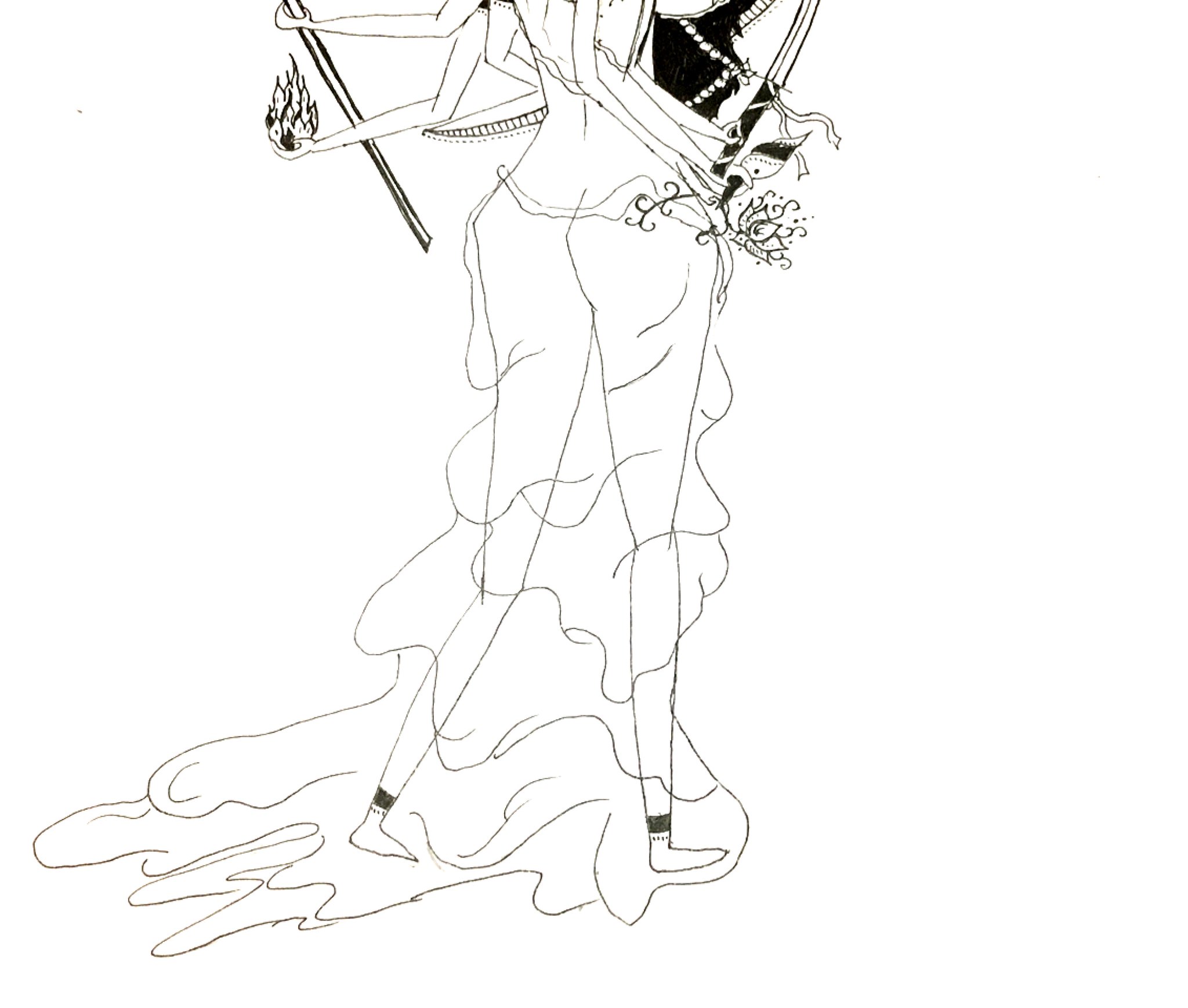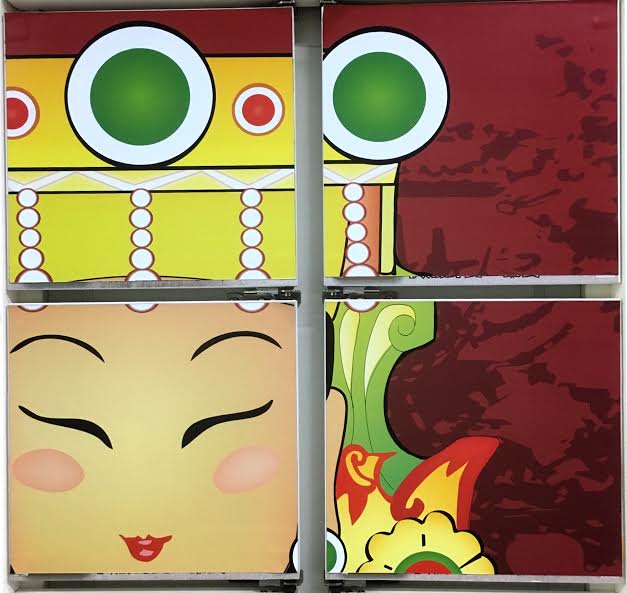 |
| Everywhere we go, we are less than: considered more from the back than the front |
But something struck me about the universality of women's experiences when it came to this case - not that every woman experiences such things, but that they are experienced by women around the world, of all ages, backgrounds and circumstances.
The English-language media I have read about these tragic events have been sympathetic, non-sensationalist and taking aim at not just the recounting of personal tragedy but at the larger social issues laid bare. If one were to read only the English-language reporting on this, one might think that Taiwan was, if anything, a more progressive and thoughtful place than the US when it came to such issues.
Of course, as New Bloom points out, this is not the case:
And so while it is important that this case be discussed by Taiwanese society, the sensationalist attitudes of the media in their treatment of female subjects are another issue which should be discussed. Indeed, much reporting on the matter in Taiwanese media has been disgraceful, seeing as while some media outlets has skirted around reporting Lin’s name for fear of legal punishment despite Lin’s parents having already released her name, this strikes as hypocritical when they otherwise have no compunction in sensationalizing similar cases—one suspects respect for the victim or concern with addressing the social issues which led to Lin’s death is the last thing on their minds.
And with that, it just feels like I've seen this sort of media circus play out, time and time again, in the USA - and while I don't read news from every country, I can't imagine it is unique to any one place. Whether you report it or not at the time almost feels immaterial: if the news becomes public, it will be sensationalized, the victim will not be accorded any amount of privacy or respect, and some people will search for any angle or reason they can think of to find a way to blame the victim.
That's as true in Taiwan as it is anywhere, although Taiwan's notably unprofessional press (yes, I said it: Taiwan may have a free press but it does not have a well-trained one, nor across-the-board professional journalistic tradition) might perhaps dive deeper into that particular gutter.
Leaving aside questions of how individual victims and families react in such situations, more than one of my students has questioned to what extent we can call what the teacher allegedly did "rape".
Why?
"She wasn't underage."
"It seemed she went out with him, she liked him, that means she flirted with him or maybe wanted him, so how could it be rape?"
"Sometimes in Taiwan women who want to go further don't say so. You have to figure it out in other ways. They won't tell you 'yes'."
"It happens a lot that a young woman wants to sleep with a man, maybe an older man, but she doesn't want anyone to think she's a 'bad girl' so if it gets out she'll say he raped her or 'seduced' her."
Of course, I won't bother explaining the very obvious reasons why any or all of these could be true, and a sexual encounter could still be rape. In terms of the last one, I don't know the 'false accusation' rate in Taiwan (I don't think anyone does, and I'm not sure anyone really knows it anywhere, but there is strong evidence in the US that it is quite rare indeed), but that's an old rhetorical weapon common in the US used to dismiss or explain away sexual assault statistics as well as individual victims, often trying to portray the accused or potentially-accused (usually men) as suffering so much more under the weight of false accusations than the victims (usually women). It usually holds no water.
What I will say is that in many cases (at least the first two), this sounds quite a bit like, well, the sort of comments one hears or reads when a high-profile sexual assault case hits American public discourse. We will never know if Lin Yi-han would have been treated fairly in court had her family filed a police report and pressed charges - though I don't have much faith that she would have been - but rape victims and alleged rape victims are routinely dragged through hell, with very little chance that their charges will ever amount to substantive punishment for their rapists. Even when a rapist is caught, and found guilty, he may well receive a too-light sentence (which, by those who seek to preserve privilege by painting privileged groups as 'the real victims', will be painted as a massive life-destroyed burden...unlike, apparently according to them, being raped).
That's as true in Taiwan as it is anywhere, although Taiwan's notably unprofessional press (yes, I said it: Taiwan may have a free press but it does not have a well-trained one, nor across-the-board professional journalistic tradition) might perhaps dive deeper into that particular gutter.
Leaving aside questions of how individual victims and families react in such situations, more than one of my students has questioned to what extent we can call what the teacher allegedly did "rape".
Why?
"She wasn't underage."
"It seemed she went out with him, she liked him, that means she flirted with him or maybe wanted him, so how could it be rape?"
"Sometimes in Taiwan women who want to go further don't say so. You have to figure it out in other ways. They won't tell you 'yes'."
"It happens a lot that a young woman wants to sleep with a man, maybe an older man, but she doesn't want anyone to think she's a 'bad girl' so if it gets out she'll say he raped her or 'seduced' her."
Of course, I won't bother explaining the very obvious reasons why any or all of these could be true, and a sexual encounter could still be rape. In terms of the last one, I don't know the 'false accusation' rate in Taiwan (I don't think anyone does, and I'm not sure anyone really knows it anywhere, but there is strong evidence in the US that it is quite rare indeed), but that's an old rhetorical weapon common in the US used to dismiss or explain away sexual assault statistics as well as individual victims, often trying to portray the accused or potentially-accused (usually men) as suffering so much more under the weight of false accusations than the victims (usually women). It usually holds no water.
What I will say is that in many cases (at least the first two), this sounds quite a bit like, well, the sort of comments one hears or reads when a high-profile sexual assault case hits American public discourse. We will never know if Lin Yi-han would have been treated fairly in court had her family filed a police report and pressed charges - though I don't have much faith that she would have been - but rape victims and alleged rape victims are routinely dragged through hell, with very little chance that their charges will ever amount to substantive punishment for their rapists. Even when a rapist is caught, and found guilty, he may well receive a too-light sentence (which, by those who seek to preserve privilege by painting privileged groups as 'the real victims', will be painted as a massive life-destroyed burden...unlike, apparently according to them, being raped).
So how is this different from the public reaction to a similar story anywhere? I don't think it is, at least not substantively. In some ways Taiwan is more sexist and patriarchal than the US or other Western countries. In other ways, it's less so. I did not particularly feel that the US was a better place to be a woman than Taiwan when I was living there - though I have friends who disagree - and if a bestselling author in the US had committed suicide as a result of depression stemming from a rape in her past, I am not sure at all that the public dialogue would be all that different, from the media coverage all the way down to the Internet trolls.
The same may be said for the difficulty in seeking treatment for depression and other issues stemming from the incident, and from potential (it's not clear in this case) issues with family. Although it is not at all clear that this is what happened in Lin's case, I could just as easily see a prominent family from any other country pressuring their daughter to not report, or cover up, a rape. I could just as easily see a woman from any other country dealing with mental health fallout from that. I could see the victim in any country feeling pressure to internalize her trauma.
I could see the patriarchy working against her, no matter where she is or where she's from.
Media frenzy aside, even the circumstances are not unique to Taiwan: pretty young woman, older male teacher (though this is not limited to that gender dynamic: older female authority figures groom young men, too). Young woman does or doesn't like the teacher - in either case, the teacher goes after her. No matter where this story goes from here, it starts with women being seen mainly as sex objects, and ends with society condemning women no matter what path they take: to say yes, to say no, to report, to internalize. And it might be this way in any country.
In sort, this is what it's like to be a woman anywhere. People of all genders are at risk of sexual assault, but women are particularly so. And if that happens, you face an unrepentant media, a potentially hostile or uncaring court, entire verbal landfills of hateful comments, thoughtful (though at times self-aggrandizing) thinkpieces, aspersions cast on your character and more.
I am not at all sure that the tragedy of Lin Yi-han sheds much light on the issues of rape, depression, suicide and patriarchy in Taiwan specifically (as New Bloom also noted, while cram schools face less regulation than other educational institutions, this sort of thing is not unique to them).
I don't mean to say that Lin Yi-han's particular story is not unique: all stories are unique, but that doesn't mean they can't add up in their similarities to a universality that affects all people and places.
The same may be said for the difficulty in seeking treatment for depression and other issues stemming from the incident, and from potential (it's not clear in this case) issues with family. Although it is not at all clear that this is what happened in Lin's case, I could just as easily see a prominent family from any other country pressuring their daughter to not report, or cover up, a rape. I could just as easily see a woman from any other country dealing with mental health fallout from that. I could see the victim in any country feeling pressure to internalize her trauma.
I could see the patriarchy working against her, no matter where she is or where she's from.
Media frenzy aside, even the circumstances are not unique to Taiwan: pretty young woman, older male teacher (though this is not limited to that gender dynamic: older female authority figures groom young men, too). Young woman does or doesn't like the teacher - in either case, the teacher goes after her. No matter where this story goes from here, it starts with women being seen mainly as sex objects, and ends with society condemning women no matter what path they take: to say yes, to say no, to report, to internalize. And it might be this way in any country.
In sort, this is what it's like to be a woman anywhere. People of all genders are at risk of sexual assault, but women are particularly so. And if that happens, you face an unrepentant media, a potentially hostile or uncaring court, entire verbal landfills of hateful comments, thoughtful (though at times self-aggrandizing) thinkpieces, aspersions cast on your character and more.
I am not at all sure that the tragedy of Lin Yi-han sheds much light on the issues of rape, depression, suicide and patriarchy in Taiwan specifically (as New Bloom also noted, while cram schools face less regulation than other educational institutions, this sort of thing is not unique to them).
I don't mean to say that Lin Yi-han's particular story is not unique: all stories are unique, but that doesn't mean they can't add up in their similarities to a universality that affects all people and places.


